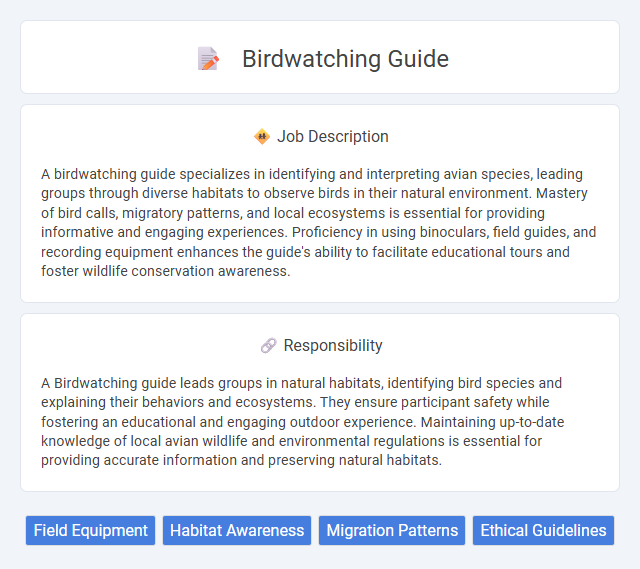
A birdwatching guide specializes in identifying and interpreting avian species, leading groups through diverse habitats to observe birds in their natural environment. Mastery of bird calls, migratory patterns, and local ecosystems is essential for providing informative and engaging experiences. Proficiency in using binoculars, field guides, and recording equipment enhances the guide's ability to facilitate educational tours and foster wildlife conservation awareness.
People with a passion for nature and patience are likely well-suited for a birdwatching guide job, as it requires careful observation and extended periods outdoors. Those who have good communication skills and enjoy educating others about wildlife may probably thrive in this role. Physical stamina and the ability to navigate various terrains might increase the chance of success in this profession.
Qualification
A Birdwatching Guide must possess extensive knowledge of local bird species, their habitats, and behaviors to provide accurate and engaging information. Certification in ornithology or wildlife biology, along with strong identification skills using field guides and binoculars, enhances credibility and effectiveness. Excellent communication skills and experience in outdoor guiding ensure safety and a memorable educational experience for participants.
Responsibility
A Birdwatching guide leads groups in natural habitats, identifying bird species and explaining their behaviors and ecosystems. They ensure participant safety while fostering an educational and engaging outdoor experience. Maintaining up-to-date knowledge of local avian wildlife and environmental regulations is essential for providing accurate information and preserving natural habitats.
Benefit
Birdwatching guide jobs likely offer opportunities to work outdoors and connect with nature, which can enhance mental well-being and physical health. Participants may develop expert identification skills and deep knowledge of local bird species, increasing their value in eco-tourism and conservation fields. The role could also provide chances to educate others, fostering environmental awareness and potentially generating a steady income through tours and workshops.
Challenge
A birdwatching guide might face challenges such as locating elusive or rare bird species, requiring deep knowledge of bird behavior and habitats. Weather conditions and terrain could likely complicate guided tours, demanding adaptability and physical endurance. Communicating complex information in an engaging way may also present a constant challenge to maintain client interest and satisfaction.
Career Advancement
A Birdwatching Guide career offers opportunities for advancement through specialization in ornithology, leadership roles in eco-tourism companies, or by developing educational programs for wildlife conservation. Gaining certifications in environmental science and acquiring advanced knowledge of bird species and habitats enhance employability and promotion potential. Building a strong network within conservation organizations and participating in research projects further supports career growth in this field.
Key Terms
Field Equipment
Field equipment for a birdwatching guide includes high-quality binoculars with at least 8x magnification, a durable spotting scope for detailed observation, and a comprehensive field guidebook to identify diverse bird species. Essential tools also feature a waterproof notebook for recording sightings, GPS devices for accurate location tracking, and weather-appropriate clothing to ensure comfort during extended outdoor excursions. Effective use of sound recording devices and mobile apps for bird call identification enhances the guide's ability to provide an informative and engaging experience.
Habitat Awareness
Birdwatching guide positions require deep knowledge of diverse avian habitats such as wetlands, forests, and grasslands, enabling accurate identification and interpretation of bird behaviors. Proficiency in recognizing ecosystem characteristics promotes conservation awareness and enriches the educational experience for birding enthusiasts. Expertise in local flora and fauna supports habitat preservation efforts and fosters sustainable ecotourism practices.
Migration Patterns
A Birdwatching guide specializing in migration patterns provides expert insights into seasonal bird movements across various habitats, enhancing the observer's understanding of avian behavior. They utilize real-time data and historical records to predict migration timelines and identify key stopover sites critical for conservation efforts. This role demands expertise in species identification, ecological factors influencing migration, and effective communication skills to educate and engage birdwatchers of all levels.
Ethical Guidelines
A birdwatching guide must adhere to strict ethical guidelines to minimize disturbances to wildlife and habitats, ensuring the preservation of bird populations. Maintaining respectful distances, avoiding nesting areas, and promoting responsible observation techniques are essential practices to protect sensitive species. Educating clients about conservation and environmental stewardship fosters sustainable birdwatching experiences that benefit both birds and their ecosystems.
 kuljobs.com
kuljobs.com